The Black Book of Carmarthen
You may click on the thumbnail images to view them full screen
Image 1
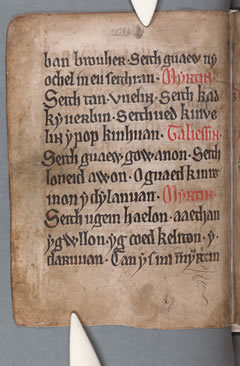
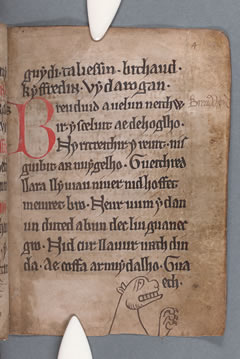
The Black Book of Carmarthen (see here for details) is one of the oldest surviving Welsh manuscripts, dating from the early thirteenth century. The manuscript is a fascinating miscellany compiled by a single scribe, and contains much of the extant material from the earliest Arthurian tradition. Apart from a few Triads, all the material here is poetry, and contains references to Arthur in various legendary contexts. Consistent with the wider tradition, we have a larger number of poems written in the voice of Myrddin (i.e., Geoffrey of Monmouth's Merlin).
The first poem in the manuscript (image 1) is 'Ymddiddan Myrddin a Thaliesin', the 'Conversation between Myrddin and Taliesin', where the two pre-eminent poet-prophets, Myrddin and Taliesin, foretell many events in the future of Britain – including the battle of Arfderydd, where Myrddin would suffer trauma and obtain his prophetic ability. The images show the end of the Conversation and the beginning of the following poem, 'Breuddwyd a welwn neithiwr' ('Last night, I saw a dream'). The rubrics denote parts assigned to Myrddin and Taliesin, and the Conversation ends with Merlin's apparent claim that his prophecy will outlast Taliesin: 'Can ys mi Myrdin guydi Taliessin / bithaud kyffredin vy darogan.'
Image 2
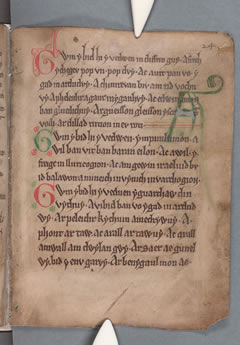

In addition to 'Ymddiddan Myrddin a Thaliesin' (image 1), three other texts connected with Merlin are the intriguing early prophecies the 'Bedwenni', the 'Afallennau' and the 'Oianau'. Image 2 shows the three stanzas of the 'Bedwenni' (the 'Birch Trees'), each beginning with the words 'Gwin y bid hi y bedwen...' (Blessed is the birch...) and the beginning of the 'Afallennau' ('The Apple-trees'), beginning 'Afallen p[er]en p[er] y cha[n]geu' (Sweet apple tree with fragrant boughs). Both these poems use the device of prophecying about what the trees may witness. The third of these poems is shown in image 3.
Image 3
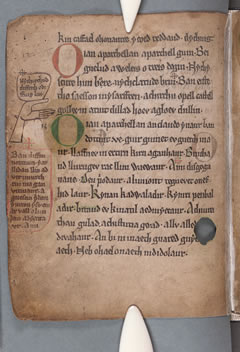
The final poem in Merlin's voice in The Black Book of Carmarthen, the 'Oianau', has Merlin declaiming to a piglet: each stanza begins 'Oian a parchellan' ('O, little pig!'); image 3 shows two stanzas from this long poem. These latter two poems, along with the Ymddiddan provide much of our understanding of the early Merlin story.
Image 4

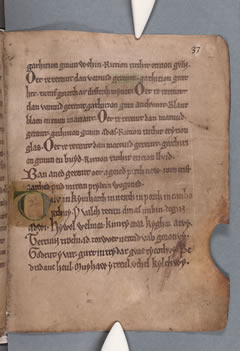
Arthur himself is obliquely present in the Black Book of Carmarthen, which has two important brief references to him. One of these is in the series of englynion composed to Geraint fab Erbin (who plays a main role in one of the three Welsh Arthurian 'romances'); Image 4 shows most of this poem, including (at the beginning of line 9 on f. 36v, the left-hand page) the reference to Arthur. The full stanza is 'En llogporth y gueleis e y arthur / guir deur kymynint a dur / ameraudur llywiaudir llawur'. This may be translated 'At Llongborth I saw with Arthur / brave men who hewed with steel;/ an emperor, leader in action'.
Image 5
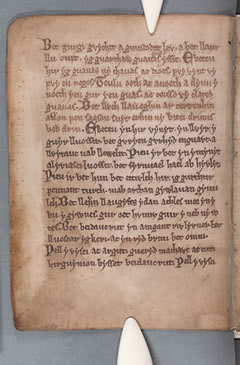
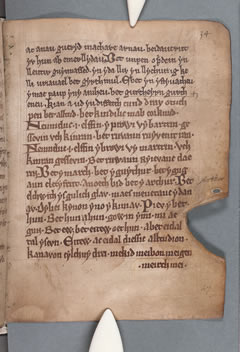
The Black Book of Carmarthen contains, in 'Englynion y Beddau', a long sequence of poems about the graves of legendary heroes, the tantalising mention of Arthur's (undiscoverable) grave, as can be seen in image 5. This may be seen in the thirteenth line of f. 34r (the right-hand page), where a later addition in the margin draws attention to Arthur's name. The line, 'anoeth bit bed y Arthur' might be translated as 'the world's wonder: a grave for Arthur'.
Image 6
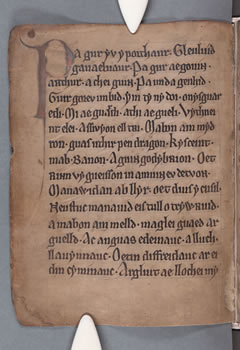

The Otherworld journey is a common feature of the Welsh Arthurian material (and of the wider tradition in general), and two early poems are important witnesses to this: The Black Book of Carmarthen contains the poem 'Pa Ŵr yw'r Porthor?' ('What Man is the Gatekeeper?'), shown in image 6, where Arthur can be seen asking the initial question. See also Image 7, from The Book of Taliesin.